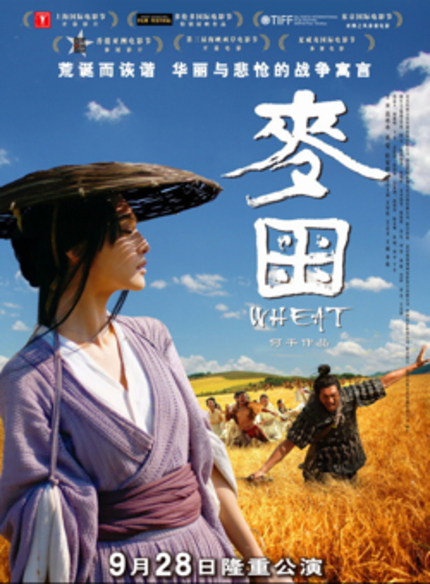WHEAT Review

There have
been so many period war epics made over the past decade, that what would once
have been regarded as a highlight of the release schedule, too often passes by
without notice. Were this down to simple audience complacency, that would be
easily redeemable, but all too frequently these films have become soulless,
generic and devoid of passion. I therefore approached He Ping's latest drama,
WHEAT, with such trepidation and muted expectations. It is with no small degree
of enthusiasm, therefore, that it can be revealed how triumphant this film is.
Set during the much-charted Warring States period, when the nation was a fractured wasteland of feudal lords and clashing tribes, director He chooses not to reenact any great battles or attempt to justify the consuming colonialism of the hugely superior Qin Army as might be expected. Instead, the drama takes place in an idyllic, fertile paradise - a remote Zhao village, nestled in a lush valley and surrounded by abundant wheat fields. After so many years of seeing China portrayed as either desolate endless deserts or otherworldly, mist-enshrouded forests, the landscape here looks positively alien - more European than anywhere in Asia.
As the film opens, it instantly draws parallels to Akira Kurosawa's THE HIDDEN FORTRESS as two Qin infantrymen desert the battlefield. Jaded warrior Xia (Huang Jue) wishes only to return home in time for the harvest, whereas his imbecilic companion, Zhe (Du Jiayi) is nothing more than a coward. After being hotly pursued by their fellow Qin, the wounded pair escapes and, mistaken by Zhao locals for their own, are brought to the village and nursed back to health. When they awaken, Xia and Zhe learn that the village is populated solely by women - war widows of the army they have just decimated - under the governance of the elegant Madame Li (Fan Bing Bing). However, assuming the two men to be from their side, Li and the other women treat them as war heroes. It is not long before the men deduce that the women no nothing of their army's slaughter and spin a fanciful, heroic tale of how the Zhao soldiers overcame their powerful adversaries and are already making their triumphant return home.
Wheat is as much a delicately handled chamber piece as it is a sweeping epic, as He counterbalances the gorgeous vistas of the wheat fields with the intimate interiors of Madame Li's house, where the soldiers slowly make their recovery. The mood in the village is one of mournful desperation, as these women have lived too long without the guidance or delicate touch of their men, and the arrival of Xia and Zhe restores hope to their otherwise failing morale. The crowd of women outside the house clamours for information, for signs of victory, for lustful gratification, slowly building a mob mentality that can be increasingly swayed by the tiniest morsel of news.
It goes without saying that soon enough the truth will out and Xia and Zhe's deception is exposed and the women's reaction shifts from the comedic to the truly frightening. He frequently uses overhead photography not only to create beautifully textured compositions but to dehumanize the mob into a single surging mass of hope, lust, anger and finally vengeance.
Fan Bing Bing is something of a revelation here. As the young woman who finds herself in authority after her husband is called away to fight, Li is ill-suited to her new role. Beneath a brave exterior she is emotionally fragile, and once she is forced to contend not only with hostile intruders, bloodthirsty locals, her growing feelings for Xia and the looming probability that her husband has died, her mental stability begins to falter. Fan magnificently captures the inner turmoil of a woman failing to live up to the task assigned her, displaying a range and subtlety in her acting that has not been seen before.
If there is a weak point in the film it is with Du Jiayi's performance as the lesser of the two deserters, Zhe. His moronic simpleton grates almost from the outset and only becomes more annoying as the story progresses. His role is integral to the story, which unfortunately keeps him on screen for a considerable amount of the film's running time, which is something of a shame. That is not to say that Du's performance is bad, but rather than the direction chosen for his character was poorly thought out and juxtaposes rather painfully with the other performances.
That said, however, there is precious little else to criticize with WHEAT. It takes it time to tell an intriguing, often humorous, yet ultimately tragic story, and does so incredibly well. It looks stunning throughout, rich with colour and deep in texture, helped by some creative lighting choices and a haunting, evocative score from Liu Xing. The wheat itself is also gorgeously filmed, not only its rich golden texture, but in its symbolism of peace, sustenance and a domestic ideal that calls to us all as it sways gently in the warm summer breeze.
Cross published in bc Magazine (Hong Kong)







